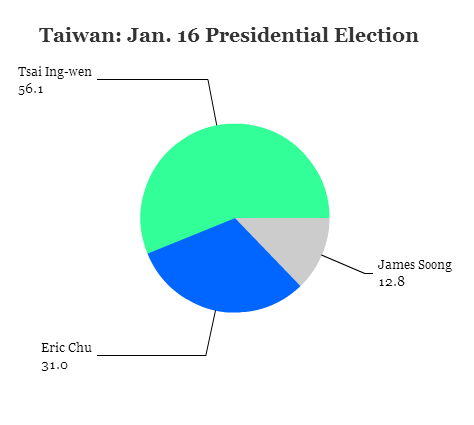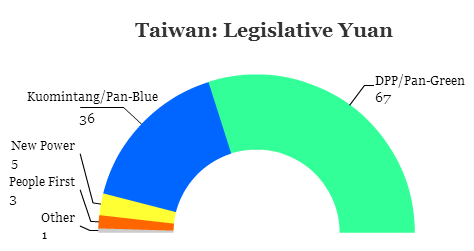
It’s not an exaggeration to say that the last time Taiwan’s pro-independence party won the presidency, it was something of a disaster. ![]()
Sixteen years ago, opposition leader Chen Shui-bian (陳水扁) ousted the ruling Kuomintang (KMT, 中國國民黨), the first time since the Republic of China (ROC) separated from the mainland in 1949.
Chen’s election came not long after Taiwan’s transition in the 1990s from one-party rule under the Kuomintang to emerging democracy. From day one, Chen faced a recalcitrant and wounded Kuomintang determined to throw roadblocks in the new government’s path. If Chen’s Democratic Progressive Party (DPP, 民主進步黨) knew little about governing, the Kuomintang knew even less about serving as the loyal opposition.
Most of all, the Kuomintang still controlled Taiwan’s legislature, giving it the tools to frustrate Chen’s agenda.
Taiwan ultimately survived its first real test of democratic transition (and, perhaps most importantly, without causing hostilities with mainland China), but not without a few bruises.
Chen’s eight years in office weren’t without victories. Taiwan formally joined the World Trade Organization in 2002 and Chen’s administration handled the 2003 SARS epidemic adroitly. But Chen’s reelection campaign featured an assassination attempt (that the opposition claims was faked) and legal wrangling over the result in court after the election. Chen’s second term ended in a blaze of corruption charges, and he and his wife were convicted on bribery charges in 2009. Chen was released on medical parole only last January.
The DPP retreated to the opposition after the 2008 elections under the leadership of a soft-spoken policymaker, Tsai Ing-wen (蔡英文), who previously headed the Mainland Affairs Council in Chen’s first term from 2000 to 2004. A graduate of Cornell University and the London School of Economics, Tsai came to politics after a career as a law professor. Despite losing the 2012 presidential election, Tsai stayed on as the DPP’s leader, and she continued to rebrand the party in the post-Chen era, efforts that have now clearly paid off.
Channeling a wave of popular discontent with the Kuomintang’s growing efforts to tie Taiwan closer to mainland China, Tsai won a landslide victory today in Taiwan’s presidential election, as expected, giving the DPP a second chance to govern the country.

What’s more, the DPP (along with its allies in the ‘Pan-Green coalition’) for the first time in Taiwan’s history will control of the Legislative Yuan (立法院), giving Tsai an unfettered chance for political success.
From a global perspective, the DPP’s victory today, long expected, is important because it could create tensions with mainland China, where leaders have been ‘warning’ Tsai for months not to take a stridently anti-mainland tone to Cross-Strait relations, and state media reports on the Taiwanese election have ranged from patronizing to misogynist to downright insulting.
The DPP, in theoretical terms, still favors a formal declaration of independence from the mainland People’s Republic of China (PRC).
But even the more fiercely nationalist ‘deep green’ Chen never attempted a universal declaration during his administration, and no one expects Tsai, who is generally seen as a highly pragmatic and ‘light green’ leader, to do so.
In her victory speech, she emphasized that she will seek to maintain the status quo with Beijing, just as she has worked throughout the campaign to reassure both Beijing and Taiwan’s allies in Washington and elsewhere. But more radical members of her party, newly empowered with a legislative majority, could try to push Tsai into a more confrontational relationship with the PRC.
Tsai faces in PRC president Xi Jinping (习近平) a strong-willed adversary expected to hold office through 2022. Xi has consolidated more power than any mainland leader in decades, and he has consistently disregarded political reforms, instead cracking down on Internet censorship and undermining long-promised free elections in Hong Kong next year. Home rule advocates will be watching the dynamic between Taipei and Beijing more closely than anyone.
Practically, however, fresh tumbles in the Chinese stock markets and a looming sense of broader economic trouble in the wider PRC economy mean that Tsai will spend far more time worrying about Taiwan’s economy than about Cross-Strait strategy. Last week, PRC premier Li Keqiang admitted that the government’s ‘bazooka’ strategy of ever more government stimulus wasn’t working to turn around the fundamental problems with the mainland economy.
Taiwan still has one of the world’s most impressive economies, but it’s linked more closely than ever to the mainland Chinese economy. Fully 27% of Taiwanese exports now go to mainland China and another 13% go to Hong Kong. But GDP growth slowed to just 1% in 2015, and Taiwan risks entering a recession this year if the wider Chinese economy collapses.
Ironically, over the years, it is the Kuomintang that has embraced closer ties with the mainland, politically, culturally and economically. Outgoing president Ma Ying-jeou (馬英九) tried to implement what would have been a landmark trade deal, the Cross-Strait Service Trade Agreement, with mainland China. Though Ma signed the agreement in June 2013, it caused such an ensuing backlash that the Yuan ultimately failed to ratify the CSSTA. Groups like the student-led ‘Sunflower Movement’ mobilized in opposition to the CSSTA as an affront to Taiwanese sovereignty, fuleing much of the discontent that voters expressed in today’s elections.
* * * * *
RELATED: Taiwan watches battle of wills
between Beijing and Hong Kong
RELATED: Ma-Xi meeting takes place with
Kuomintang’s political woes looming
* * * * *
One of the Sunflower Movement’s leaders, Huang Kuo-chang (黃國昌), now leads the New Power Party (NPP, 時代力量), a new reform-minded third force in Taiwanese politics. Campaigning in its first legislative election, the NPP won five seats. It’s an impressive showing, and it means that Taiwan’s fresh legislature will be even more liberal and pro-independence than reflected in the DPP’s landslide.
In November 2015, with his party stumbling in its efforts to avoid facing defeat in today’s election, Ma met with Xi Jinping in Singapore, the first face-to-face meeting between the leaders of the Kuomintang and the mainland Chinese Communist Party (CCP, 中国共产党) since before 1949. Though it may have been a landmark in Cross-Strait relations, it’s the sense of Ma’s willingness to cozy up to mainland China that has made the Kuomintang so unpopular in recent years.
It’s not clear whether Ma even hoped the meeting could bolster the Kuomintang’s political fortunes after it dumped its first presidential contender, Hung Hsiu-chu (洪秀柱), the vice president of the Legislative Yuan, in favor of Eric Chu (朱立倫), the party chairman and New Taipei mayor.
The Kuomintang, which leads the Pan-Blue coalition, was founded on the mainland in 1911 by Sun Yat-sen, the president of China’s early 20th century republic. After World War II, the nationalist Kuomintang leadership fled to Taiwan as the Communists took power across the rest of China. Many of the DPP’s supporters today come from the ranks of native Taiwanese who thrived on the island long before the Chinese nationalists decided to make their long-frozen stand against the CCP and who resented the Kuomintang’s autocratic regime in the last half of the 20th century. In the 1980s and the 1990s, the DPP and other allies were at the forefront of the movement to democratize Taiwan’s politics.
Until the 1970s, the world recognized the Taipei-based Kuomintang government as ‘China,’ though that changed in the 1970s as the PRC began to engage the United States and the international community. By 1979, the United Nations recognized the PRC (not the ROC) to take China’s seat among the five permanent members of the Security Council. Despite military, political and economic support from successive American governments, Taiwan has increasingly found itself in geopolitical limbo.
Since 1992, the Taipei and Beijing governments have operated under the ‘One China’ principle — both agree that there’s just one China, though they have obviously different views about which government is the legitimate leader of China. It’s sometimes a baffling polite fiction, but it has kept the peace between the two governments. Increasingly, it has even led to something like normalization. Direct flights between Taiwan and the PRC began in 2008, and the CSSTA was just one element of a much broader growth in economic relations and trade.